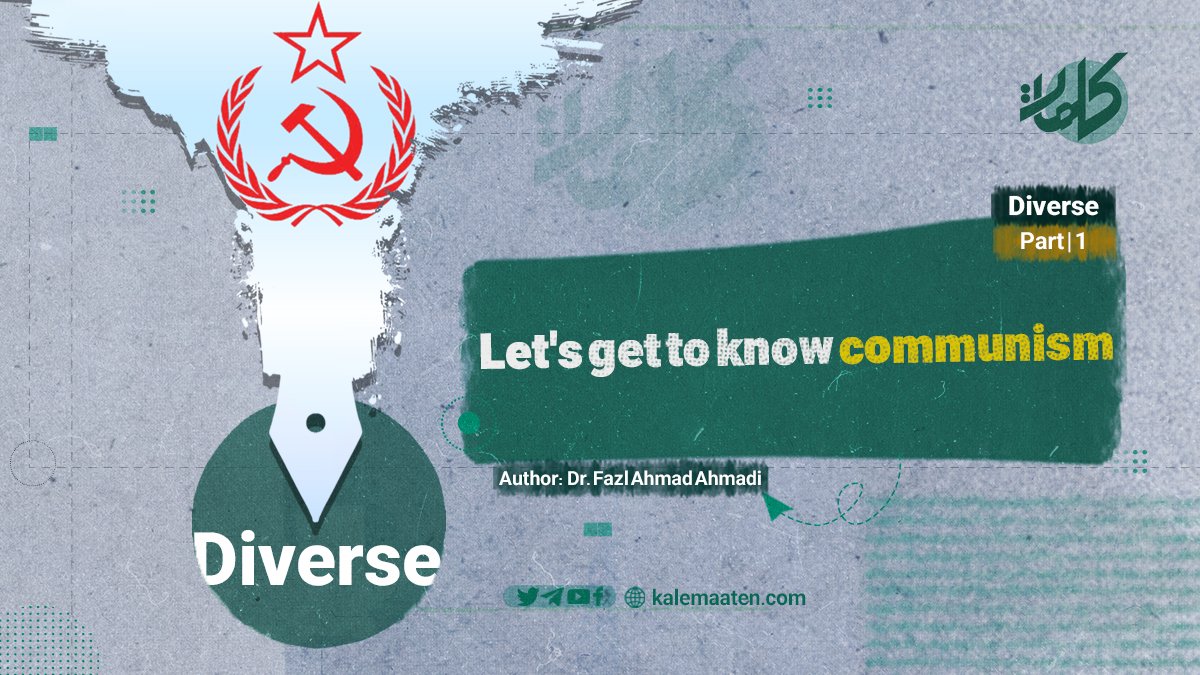
Author: Dr. Fazl Ahmad Ahmadi
Let’s get to know Communism (Part one)
Abstract
One of the political ideologies that flourished in recent centuries, particularly during the 19th and 20th centuries, and gained numerous adherents, is communism. Communism, which was predominantly practiced in Eastern Bloc countries and centered around the Soviet Union, eventually faded from the global stage of power. Nevertheless, this ideology still attracts many followers, with some believing that no other political ideology can better govern human societies than communism. This raises the question: What is communism as an ideology, and what are its stages? Using a descriptive-analytical method and library resources, this study finds that communism is a political ideology primarily aimed at eliminating social classes and leveling human lives. This ideology, which reached its true prominence through Karl Marx’s works, progresses through multiple stages, with communism itself being considered the ultimate stage. Its mission is to liberate all humanity from social inequality, all forms of oppression and exploitation, and the horrors of war, while bringing peace, labor, freedom, equality, fraternity, and prosperity to all nations.
Keywords: Communism, political ideology, classes, stages, socialism, mission.
Introduction
Historically, communism is one of the political ideologies whose roots can be traced back to ancient Greece. However, this political ideology, which evolved in recent centuries, particularly during the 19th and 20th centuries, culminated in modern communism. Communism, primarily dominant in the Eastern Bloc, with the Soviet Union as its center, gradually lost its grip on power. Despite this, it continues to attract numerous adherents, with many asserting that no other political ideology is better suited to govern human societies.
Research on political ideologies in general and communism in particular remains significant in the 21st century. Understanding diverse political and philosophical beliefs is crucial for fostering political, economic, and cultural growth. Examining communism as a political ideology is, therefore, vital for developing mutual respect for differing beliefs and highlighting the enduring appeal of ideologies that might, from certain perspectives—especially from an Islamic standpoint—be deemed unacceptable.
Numerous books and articles have been written on political ideologies, and most general discussions on the subject include substantial or brief analyses of communist doctrines. However, the distinguishing feature of this study is its succinct overview of the core beliefs, foundations, and elements of communism. This research provides readers with a comprehensive understanding of communism, its foundational beliefs, and its historical trajectory.
Using a descriptive-analytical method and library resources, this study finds that communism is a political ideology aimed at eliminating social classes and equalizing human life. Developed through Karl Marx’s works, it involves multiple stages, culminating in communism as the ultimate phase. Its mission is to free humanity from social inequality, oppression, exploitation, and war while promoting peace, labor, freedom, equality, fraternity, and prosperity for all nations.
1. The Concept and Characteristics of Communism
The term “communism” broadly encompasses a variety of social systems, including ancient Spartan society, Christian communist communities of the 16th century and beyond, and utopian concepts like Plato’s Republic, Thomas More’s Utopia, and the communal societies proposed by Fourier, Robert Owen, and others. Modern communism, however, emerged primarily through Karl Marx’s ideas (Marxism) and the notion of a classless society based on collective ownership.
Etymologically derived from the Latin word communis (meaning “common”), communism refers to a scientific, political, and economic movement that gained prominence in the 19th century, primarily through Karl Marx’s theories and the Communist Manifesto. Marx coined the term “communism” to distinguish his socialist workers’ movement from the non-proletarian socialism of the 19th century. This political movement seeks to abolish private ownership of production tools, eliminate wage labor, and dismantle social classes through a workers’ revolution.
Communism advocates for public ownership of production tools and envisions a classless society devoid of private or state ownership. It is a philosophical, political, and economic ideology that emerged in opposition to capitalism and liberal democracy in the 18th century. In its ideal form, communism, as theorized by Marx, represents a classless society where wealth is collectively owned, production aligns with human needs, and the state “withers away,” enabling spontaneous and automatic societal harmony.
Key characteristics of communism include:
1. Marxism-Leninism as the “official” ideology: The political philosophy underpinning communist movements.
2. The Communist Party’s monopoly on political power: Organized based on the principles of “democratic centralism.”
3. Domination by the Communist Party: The party wields authority over the state apparatus by merging party and state institutions.
4. Control over all institutions: The Communist Party oversees economic, educational, cultural, and recreational institutions, assuming a “guiding and leadership” role.
5. State-controlled economic life: The economy is based on collectivization and centralized planning.
Despite its widespread implementation, particularly in Russia and Eastern Europe, communism—like Plato’s communal theories—failed to endure in practice.
Continues…


